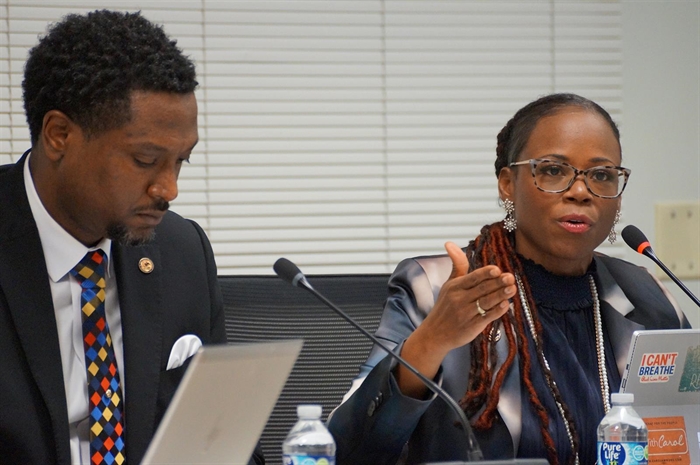URBANA – As the 2024 election season draws near, voters in Illinois will once again choose whether they want to cast their ballots in person or by mail.
But one lawmaker is proposing a bill in the Illinois House that could make that decision a lot easier, making voting by mail the default option for people in counties and cities that choose to go that route.
State Rep. Carol Ammons, D-Urbana, said voting by mail has been shown to be a more convenient and efficient way of running elections.
“Vote-by-mail has been proven by way of court order, as well as people’s utilization of vote-by-mail – I vote by mail – that it has been safe,” she said during an interview. “There have been no problems. I have not missed a single election. And people who use it increase their voter participation.”
Voting by mail, often referred to as absentee voting, was originally intended for people who planned to be away from home on Election Day, particularly military personnel, as well as college students and people whose jobs required them to travel. That often required voters to ask their state or local election official for an absentee ballot and, in some cases, explain why they wanted to vote by mail.
In more recent years, Illinois and other states have made voting by mail an option for anyone by adopting “no-excuse” absentee voting laws, meaning anyone could request a mail ballot without giving a reason.
Illinois also gives voters the option of asking to be placed on a permanent vote-by-mail list so they can automatically receive a mail-in ballot without having to fill out a new request for one each election cycle.
And in 2020, amid the COVID-19 pandemic, the General Assembly passed a law requiring local election officials automatically send vote-by-mail applications to every voter in their jurisdiction, instead of requiring voters to ask for one.
During a special meeting of the House Ethics and Elections Committee Wednesday in her hometown of Urbana, Ammons said voting by mail has become increasingly popular. But she said the multi-step process of voting by mail is still inefficient because it requires voters to fill out and send in a vote-by-mail application to receive a ballot.
“But when we went back to look at the utilization of the ballots, the number that came back, and the cost associated with mailing a ballot, we realized as we talked to other jurisdictions that you would actually save the money if you simply mailed them the ballot,” she said.
Ammons is the sponsor of House Bill 4198, which would allow county clerks and other local election authorities to make voting by mail the default option in their jurisdiction. It would give them the option of mailing ballots to all registered voters in their jurisdiction, without requiring voters to ask for one. But it would still require local election authorities to offer in-person voting as well for those who prefer to cast their ballot in person.
Currently, eight states and Washington, D.C., operate elections almost entirely by mail. William Cavecche, an election administrator in King County, Washington, which includes the city of Seattle, said that state passed a similar law in 2005 and immediately, two-thirds of the counties in the state shifted to vote-by-mail systems.
“Speaking to someone who has run both polling-place elections and vote-by-mail elections, I can tell you from experience that vote by mail elections are significantly easier to administer,” he said.
Among other benefits, Cavecche said, in a vote-by-mail election, there is no need to worry about problems that commonly occur at in-person polling places such as running out of ballots, voting machines breaking down or poll workers failing to show up.
He also said vote-by-mail elections are more secure because all ballots can be counted in a centralized location. He said ballot counting can also be livestreamed on the internet to provide more public transparency.
Wednesday’s meeting was a subject matter hearing, meaning the committee only heard testimony and did not take action on the bill. But Rep. Maurice West, D-Rockford, who chairs the panel, said he intends to hold additional hearings during the upcoming legislative session, which begins Tuesday, and it’s possible lawmakers could vote on the measure in time to take effect for the 2024 general election in November.

